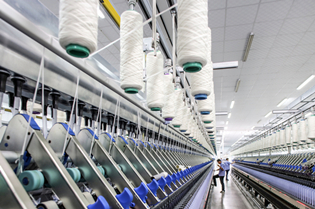Inner Mongolia builds pollution-free mutton industry
Market calls for brand development
Inner Mongolia has several famous brands nationwide, such as Erdos, Yili and Mengniu, but it doesn’t have a household brand for mutton. Therefore, establishing a big mutton brand is pressing.
The fake mutton incident in 2013 greatly undermined the integrity of the national mutton industry and hurt profits of standup mutton companies. However, the incident brought an opportunity for Inner Mongolia to develop its pollution-free mutton. Under local government supervision, Inner Mongolia’s mutton industry has made great strides in eliminating substandard enterprises, and realizing standardized and scale development. Local mutton companies have become more disciplined and have taken the initiative to upgrade industrial operations, boosting the healthy and sustainable development of the whole mutton industry in the region.
“The fake mutton incident cut off counterfeit products in mutton industry development and helped ensure healthy development of the whole industry,” said Guo Xiaodong, president of Xilin Gol League Zhengli Live Stock Products Co. Inner Mongolia’s mutton industry has made the best use of the circumstances to set up its image, which has driven the whole mutton industry, according to Guo.
Yan Shuchun, president of Mengyang said that brand development is the only way for a company to get stronger. Mengyang recently finished a five-year brand development strategy plan and will take steps to build itself into a top brand in China’s mutton industry.
The 2014 World Meat Congress will be held by the International Meat Secretariat at the Beijing International Convention Center from June 14-16, with Mengyang attending. It will deliver a speech on behalf of the Chinese mutton companies, marking the first step forward in the company’s brand expansion, which is significant for Inner Mongolia’s mutton brand development.
Foster leading companies
At the moment, Inner Mongolia’s mutton output stands at 800,000 tons, with 80 million sheep on hand. It has three sheep breeding belts that are populated by Hulunbeir, Ujimqin, Sonid and Bamei sheep, paving the way for pollution-free mutton development.
Inner Mongolia’s farming and animal husbandry department came up with a guidance on nurturing leading mutton companies to promote industrial cluster development and upgrading farming and animal husbandry industrialized operations in April. It called for fine processing and sales, brand establishment, and market and industrial scale expansion.
Jia Jinmei, deputy director of the industrialization office at the husbandry department, said that Inner Mongolia will build a mutton industrial park and regroup mutton processing companies, such as Mengyang, Xiaoweiyang and Mengdu Sheep, to set up large business groups and build a famous brand. The region will establish trace management that integrates breeding, processing, circulation and sales. It will also allow the leading mutton company to work with other industrial players, specialized sheep breeding cooperatives or households to form a large-scale mutton combo. It will push ahead processing company regrouping and mutton park construction to create its own distinctive mutton brand.
Inner Mongolia will also issue favorable policies to boost mutton industry development. “The government should take steps to increase financial and policy support to build the mutton industry into the third calling card for the region, right after the dairy and wool industries,” said Jia Jinmei.



 Print
Print Mail
Mail





